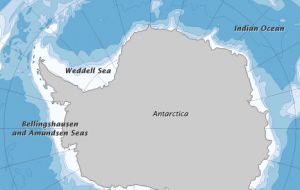MercoPress. South Atlantic News Agency
Invasive species threaten Antarctica; climate change and visitors boom blamed
 How pristine was my frozen continent?
How pristine was my frozen continent? Antarctic tourists and scientists may be inadvertently seeding the icy continent with invasive species, a new study says. Foreign plants such as annual bluegrass are establishing themselves on Antarctica, whose status as the coldest and driest continent had long made it one of the most pristine environments on Earth.
But a boom in tourism and research activities to the Antarctic Peninsula may be threatening the continent's unique ecosystems, scientists say.
For the study, ecologist Steven Chown at the University of Stellenbosch in South Africa and colleagues vacuumed the clothes, footwear, bags, and gear of approximately 2% of people who visited during the Antarctic summer from late 2007 to early 2008. That amounted to 853 scientists, tourists, and accompanying support workers and ships' crew members.
“Endless hours were spent vacuum-cleaning clothes and gear. ... If one is doing so on a ship underway on a rough ocean, it can take a strong stomach,” Chown recalled.
The results revealed more than 2,600 seeds and other detachable plant structures, or propagules, had hitched a ride to Antarctica on these visitors.
On average, tourists each carried two to three seeds, while scientists each carried six. However, the annual number of tourists now far outnumbers that of scientists, about 33.000 tourists to about 7.000 scientists in the 2007-2008 Antarctic summer. As a result, tourists and scientists likely pose similar risks overall to Antarctica, Chown said.
Disturbingly the scientists said that 49 to 61% of the foreign plant material that reaches Antarctica are cold-adapted species that can withstand and colonize in extreme conditions. The plants likely get stuck to cold-weather gear that travelers had used in other frigid climes prior to arriving to Antarctica.
For instance, Arctic species such as chickweed and yellow bog sedge have been found in Antarctica, according to the study, published March 5 in the journal Proceedings of the National Academy of Sciences.
Based on the nature of these foreign species and the present climate of Antarctica, the areas at highest risk are the Antarctic Peninsula coast and surrounding islands, the study said.
According to climate projections for 2100 from the UN's Intergovernmental Panel on Climate Change (IPCC), invaders may also take root in the coastal, ice-free areas to the west of the Amery Ice Shelf and, to a lesser extent, in the Ross Sea region. What's more, rising temperatures along the Antarctic coast will likely aid these intruders' survival.
Even so, “it should not be imagined that Antarctica will suddenly be covered in flowering plants and weeds,” Chown said. “Much of it is still a very harsh place, and plants do not grow on ice, which still dominates the continent.”
Chown and his team also plan to present their work to the Committee for Environment Protection of the Antarctic Treaty.




Top Comments
Disclaimer & comment rules-

-

-

Read all commentsI didn't know Argentinians are classed as an Invasive species. But it all makes sense, they do love invading.
Mar 07th, 2012 - 05:57 pm 0Is there no article that can be published without the oblifgatory reference to global warming?
Mar 08th, 2012 - 09:59 am 0“The results revealed more than 2,600 seeds and other detachable plant structures, or propagules, had hitched a ride to Antarctica on these visitors.” They have the answer, where is global warming in all this?
Dennis- The links with global warming are that, as the Antarctic climate is moderated, the tourist season can be extended and some inaccessible areas may now become more accessible.
Mar 08th, 2012 - 10:55 am 0In addition, once invasive species and seeds have been brought into the Antarctic, they will have more chance to grow in a longer and milder growing season.
Commenting for this story is now closed.
If you have a Facebook account, become a fan and comment on our Facebook Page!